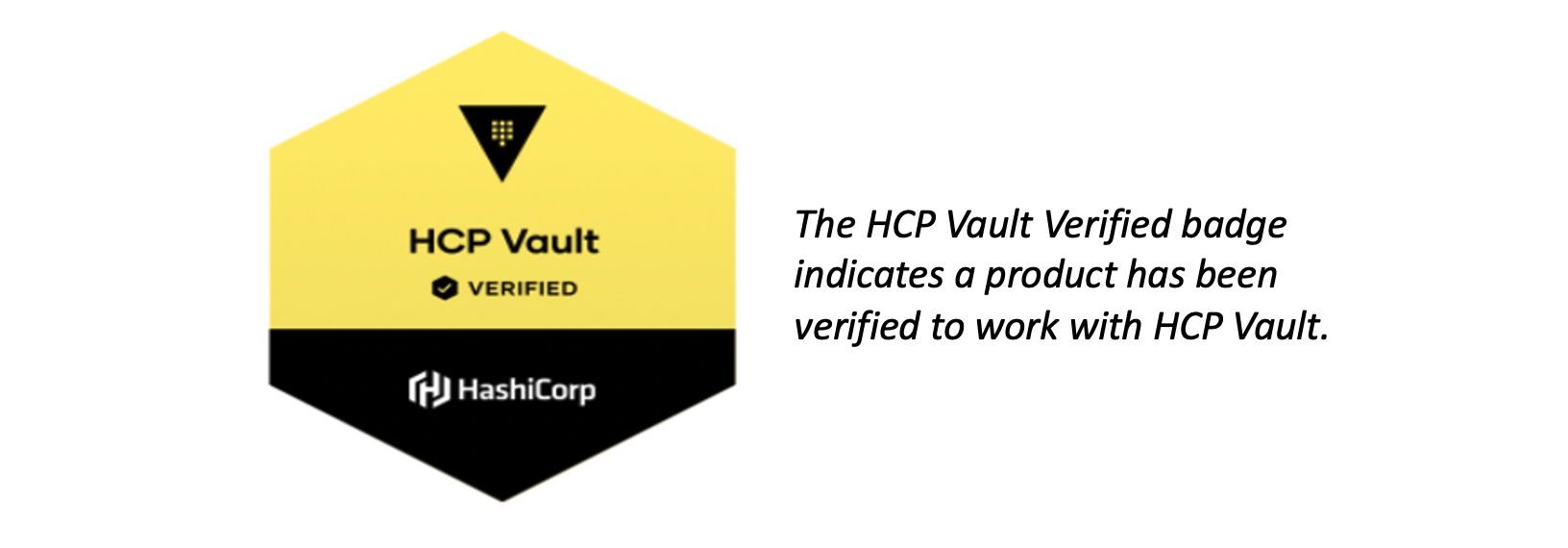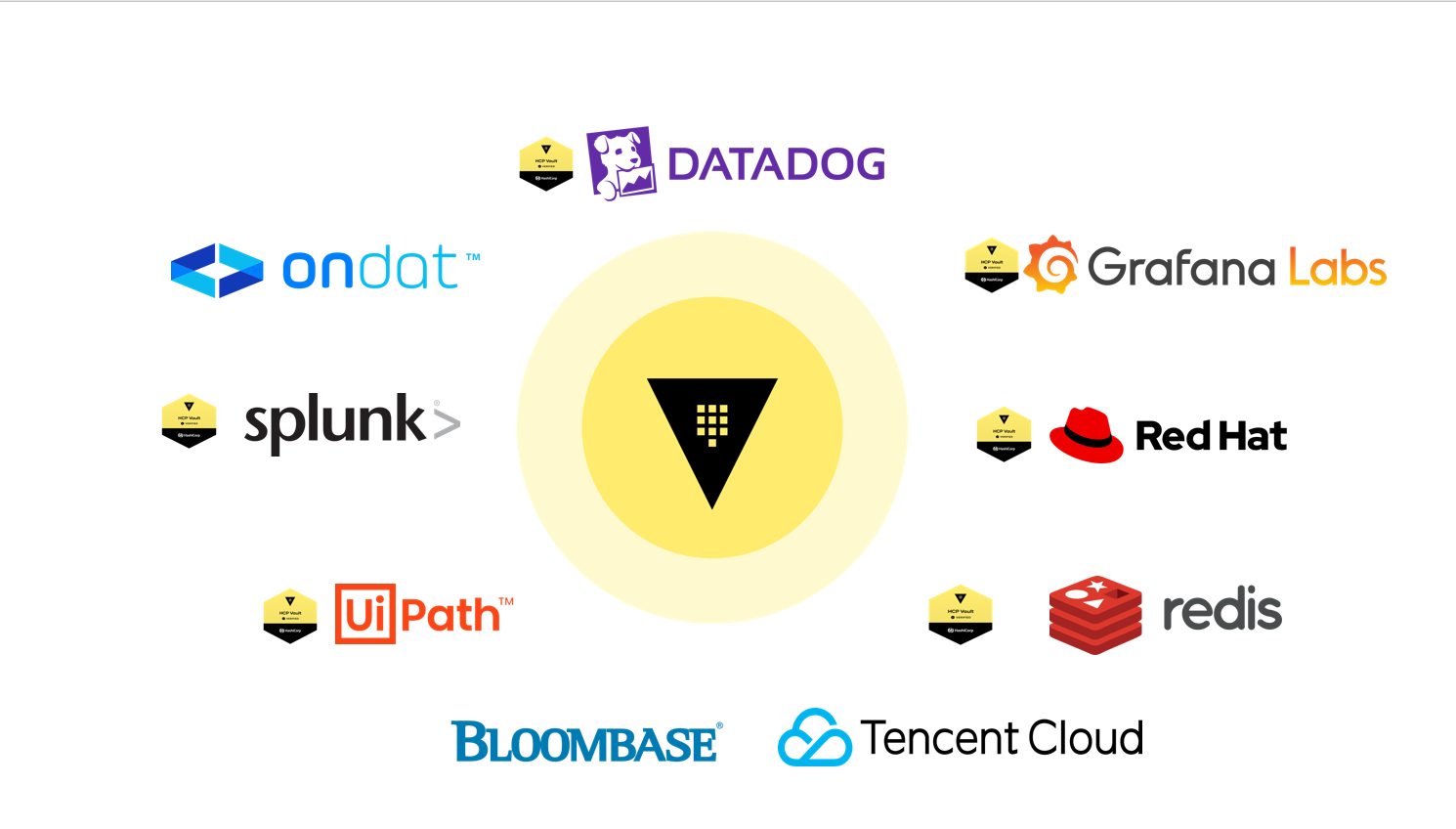The HashiCorp Vault partner ecosystem continues its upward trajectory as 12 new self-managed and HashiCorp Cloud Platform (HCP) Vault verified integrations — from nine different partners — were completed this past fiscal quarter.
HCP Vault verified integrations joined our Vault partner ecosystem as we verified six additional integrations from Datadog, Grafana Labs, Redis Labs, Red Hat, Splunk, and UiPath. (Achieving the HCP Vault Verified badge indicates a product has been verified to work with HCP Vault.) We also saw the addition of four self-managed Vault integrations to our growing ecosystem.


»New HCP Vault Verified Integrations
HCP Vault is a fully managed platform that is operated by HashiCorp, allowing organizations to get Vault up and running quickly. The following new integrations are now verified to work with HCP Vault as well as self-managed Vault:
»Datadog
HashiCorp Cloud Platform (HCP) Vault now supports Datadog integration to monitor and visualize audit logs and metrics from its observability SaaS platform.
»Grafana Labs
Grafana is also able to monitor an HCP Vault cluster for log and metrics usage to enhance security operations, plan for sufficient infrastructure capacity, and identify opportunities to optimize usage patterns for cost savings.
»Red Hat
Red Hat has created a Vault and Red Hat Kubernetes config operator to assist with Vault configurations. The operator helps streamline the preparation steps that need to occur in Vault before secrets can be consumed by applications.
»Redis
The Redis Enterprise Kubernetes operator integration enables the use of secrets for the control-plane credentials used by the operator for Redis Enterprise and ancillary services from HCP Vault.
»Splunk
Splunk is now able to monitor an HCP Vault cluster’s logging and metrics and visualize them in the Splunk app. For more information on the Splunk app, which provides an out-of-the-box Vault monitoring experience, read our blog post: Splunk App for Monitoring HashiCorp Vault.
»UI Path
Ui Path has completed both self-managed and HCP Vault verified integrations. HashiCorp Vault provides credentials for use in UiPath Orchestrator via two modes: read-write for accessing secrets created in Vault or storing secrets created through Orchestrator, and read-only where secrets are created and managed in Vault and only read by Orchestrator.
»New HashiCorp Vault Integrations
We also saw four new self-managed-only Vault integrations:
»Bloombase
Bloombase StoreSafe integrates with HashiCorp Vault to utilize Vault as a centralized key manager allowing StoreSafe customers to encrypt their data at rest using encryption keys provided by Vault.
»Ondat
The Trousseau KMS provider plugin utilizes Vault as an external key management server for encrypting Kubernetes secrets being stored in etcd_.
»Tencent
We saw two integrations with Tencent in this past quarter. The Vault & Tencent Cloud secrets plugin generates unique, ephemeral Tencent Cloud user API keys and STS AssumeRole credentials. The Vault & Tencent Cloud auth plugin authenticates Vault clients using Tencent Cloud's Cloud Access Management (CAM).
»Learn More
The HashiCorp Vault Integration Program allows for partners to integrate their products to work with HashiCorp Vault (both the open source and Enterprise versions) or HCP Vault.
As a fully managed service, HCP Vault offers an easy way to secure, store, and tightly control access to tokens, passwords, certificates, encryption keys, and other sensitive data. For more information about HCP Vault and pricing, please visit the HCP product page or sign up through the HCP portal.
More Information on Earlier Vault Integrations:
- HCP Vault Adds 3 New Observability Integrations
- HCP Vault Observability at Scale Using Datadog’s Vector
- Confluent, JFrog and ServiceNow Integrations Highlight Additions to the Vault Ecosystem
- HashiCorp Vault Surpasses 100 Integrations with 75 Partners
- HashiCorp Vault Integrates with ServiceNow for Credential Management
- GitHub, F5, and Okta Among New HCP Vault Integrations
- HashiCorp Releases Identity-based Security as a Service on the HashiCorp Cloud Platform








